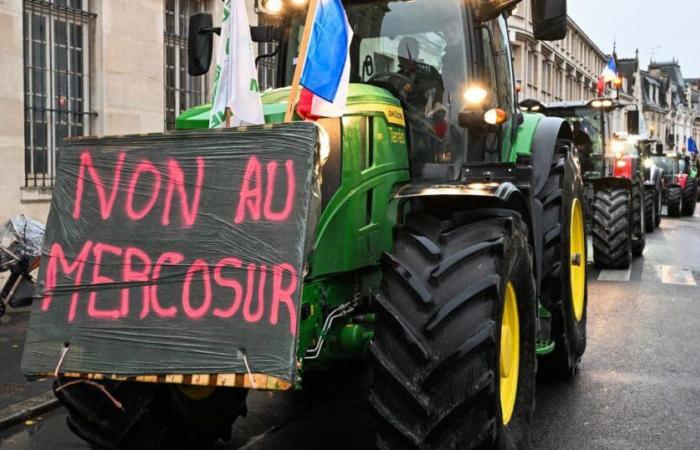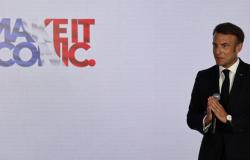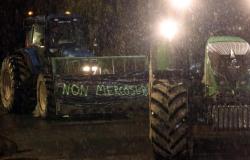If the agreement is signed by members of the European Union, certain products from South America would be exempt from customs duties. And could take a more important place in the diet of the French.
In the farmers' demonstrations this Monday, the name of the agreement is on everyone's lips and on all the placards. In France and Europe, the EU-Mercosur agreement scares producers, who fear losing market share to less expensive foods imported from South America, which do not meet the same requirements in terms of production methods. . “There are two worlds that separate us”underlines Marine Colli, consultant and specialist in agricultural policies. At the end of the chain, consumers risk ending up with more products filled with pesticides, antibiotics or even genetically modified organisms (GMOs), which are harmful to their health.
If the agreement is signed by members of the European Union, Mercosur countries could export certain foods exempt from customs duties and in larger quantities. Among the countries that make up the union are Argentina, Brazil, Uruguay, Paraguay and Bolivia. But the country of Corcovado particularly worries specialists. “There are colossal structural differences between French farms and those in Brazil, which can be up to 50 times larger”explains Marine Colli. Fattening centers also exist in the country, sometimes with up to 30,000 cattle on the same farm, fed GMOs and stuffed with antibiotics. Under Mercosur, 99,000 tonnes of beef could be imported, or 1.6% of EU production.
Also read
Pesticides, antibiotics, animal welfare… These differences in standards between the EU and Mercosur which irritate
”
data-script=”https://static.lefigaro.fr/widget-video/short-ttl/video/index.js”
>
“Relatively superficial” traceability
In addition to beef, 180,000 tonnes of poultry meat could also arrive on European soil, or 1.4% of European production. Added to this is pork, with 25,000 tonnes authorized in the European Union (0.1% of production). “But it’s not just meat, Europe already imports a lot of soya and corn, from GMO crops” located in the Mercosur countries, explains Marine Colli. With the agreement, 180,000 tonnes of sugar and 60,000 tonnes of rice could also be imported into the European Union. However, productions in Brazil use a “very long list of pesticides yet banned in France and Europe”.
Last year, the general association of corn producers showed that out of 178 pesticides used in Brazil and Argentina, 138 were banned in France. Among them are neonicotinoids, known for their danger to biodiversity but also to human health. “Brazil uses them routinely, for example on sugar, on which we cannot look for residues because there is no mirror measure which authorizes the European Union to monitor production”explains Marine Colli. Checks on processed products are therefore impossible, such as cheese, honey or even powdered milk, some of which comes from Mercosur countries. “To have reliable controls, we need reliable traceability, which is currently relatively superficial”points out Ludovic Brindejonc, director of the Agri-Ethique label.
Also read
Understanding everything about the agreement between the European Union and Mercosur
The “ultra-strategic” role of mass distribution
If the multiplication of imports from Mercosur countries would only represent a small share of European production, the specialist fears a “market destabilizing effect in an economic context that is already very fragile for producers”. “The risk is to end up with more products with characteristics that are always different from those of the EU”adds Ludovic Brindejonc. On the shelves, “it’s the consumer who will be lost” with product origins discreetly written on the packaging. “In the current context, customers are very sensitive to prices and they risk moving towards these less expensive and less healthy products”analyzes the director of the Agri-Ethique label.
For Ludovic Brindejonc, the responsibility lies above all with the distributors, who have the possibility of directing consumer purchases: “The offer must be qualified in the stores. The role of mass distribution is ultra-strategic. Promotion can also be a way to support French farmers, without lowering the price paid to producers.” For his part, Michel-Edouard Leclerc, president of the strategic committee of Leclerc stores, proposed this Monday morning to extend the Origin'info label “and to force the entire food industry to say where their products come from”. “I would like someone not to force me to pay more for Spanish chicken” than that imported outside European borders, he criticizes this Monday morning on BFMTV.
Ultimately, it is the consumer who will make the final choice on the shelves. “If there are no sales, there will be no income. Farmers and distributors need to find the right message to reassure customers.”admits Michel-Edouard Leclerc, who fears that French products will plummet like the organic sector. A way of the cross which only seems to be in its infancy, at a time when farmers' protests are increasing throughout Europe.






